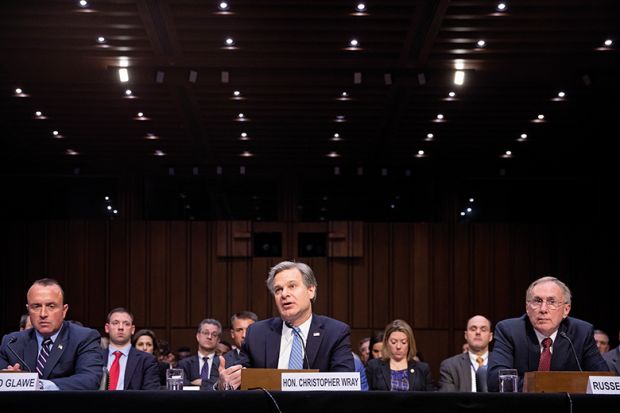The FBI regards US universities as growing more attentive to its requests that they use a targeted hunt for contractual violations as a means of evicting foreigners from sensitive research positions.
However, it remains unclear whether the large number of apparent disclosure and sharing violations involving China signals the true scale of the problem, or reflects the FBI’s greater interest in pursuing cases specific to that country.
In a report to the US Senate, the FBI’s director, Christopher Wray, said that US academic institutions – despite public statements of wariness from many – were now “much more actively engaged with” the FBI in its pleas for help against foreign espionage.
“I’ve been actually quite encouraged by quite a number of universities which a few years ago would not have wanted to meet with the FBI under any circumstances, much less in the kind of partnership way that’s occurring now,” Mr Wray told the US Senate’s Homeland Security Committee.
In public statements, US university leaders have acknowledged their willingness to help fight genuine instances of espionage on their campuses, while sternly warning that the administration may be going too far.
US universities have had trouble pushing back, however, because the Trump administration has largely cloaked its foreign scientist crackdown in the trappings of a broader campaign for accountability in the federal government’s multibillion-dollar system of research grant awards.
Top officials at the two largest federal providers of basic research money for universities – the National Institutes of Health and the National Science Foundation – insisted that their agencies apply their programme integrity rules without any biases concerning ethnicity or nationality.
Yet the NIH has acknowledged that ethnic Chinese scientists account for most of the 180 scientists it is investigating in a current enforcement campaign, largely for violations such as not reporting outside research affiliations. The NIH has recommended that at least 21 of them be barred from future grants, and several have been fired by their universities. The NSF has said it will issue some of its own figures on the matter in a report on enforcement actions expected in December.
Michael Lauer, the deputy director for extramural research at the NIH, and Rebecca Keiser, head of the Office of International Science and Engineering at the NSF, both said that their agencies were typically limited to acting upon fraud allegations brought to them by outside sources, such as the FBI.
“That’s the way that it works,” Dr Keiser said. “And there is no bias about it being foreign or domestic in that situation.”
Mr Wray, however, told the Senate that the FBI was greatly interested in finding contractual violations involving foreign scientists that can be used to evict them from their institutions and the country. “They can be essentially kicked out on that basis,” Mr Wray said. “And sometimes that’s a lot better solution than traditional law enforcement.”
Dr Lauer has acknowledged being especially concerned with ethnic Chinese scientists either using their participation in his agency’s internal grant review panels to learn details of cutting-edge work and share it with their colleagues, or using undisclosed outside funding – usually from their home government – to secretly replicate their NIH-funded work.
Neither the NIH nor the NSF, however, has its own randomised processes to assess whether the large number of Chinese cases reflects in part the FBI’s specific interest in the country.
Without that kind of check, said Michael Fisher, a senior fellow at the Federation of American Scientists, it’s difficult to affirm that US government officials were truly fighting the misuse of federal research grant money irrespective of ethnicities and nationalities.
Fighting espionage was important, Dr Fisher said, but it should not be done without a clearer understanding of how the government defined basic research, and whether it still believed that all such research should be openly shared.
“A lot of what we’re seeing is the US government potentially re-evaluating the nature of fundamental research”, without openly considering the trade-offs, Dr Fisher said.
The NSF is taking steps in that direction, having asked an independent scientific advisory group known as JASON to offer advice on finding the right balance between open science and national security. The JASON report is completed and under review by NSF officials, who plan to release it next month.
The Trump administration’s top science adviser, Kelvin Droegemeier, has expressed an interest in having that question examined by an interagency body of government experts he created, known as the Joint Committee on the Research Environment. It hosted a White House meeting last week with dozens of researchers where at least one attendee, Deborah Frincke, director of research at National Security Agency, warned against making US research policy “too nationalist”, the Daily Caller reported.
POSTSCRIPT:
Print headline: US universities tentatively help FBI fight espionage
Register to continue
Why register?
- Registration is free and only takes a moment
- Once registered, you can read 3 articles a month
- Sign up for our newsletter
Subscribe
Or subscribe for unlimited access to:
- Unlimited access to news, views, insights & reviews
- Digital editions
- Digital access to THE’s university and college rankings analysis
Already registered or a current subscriber? Login







